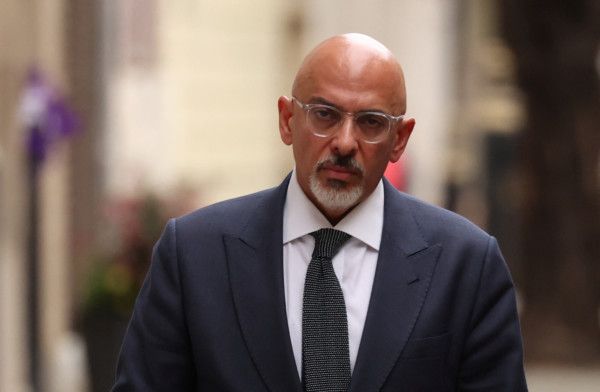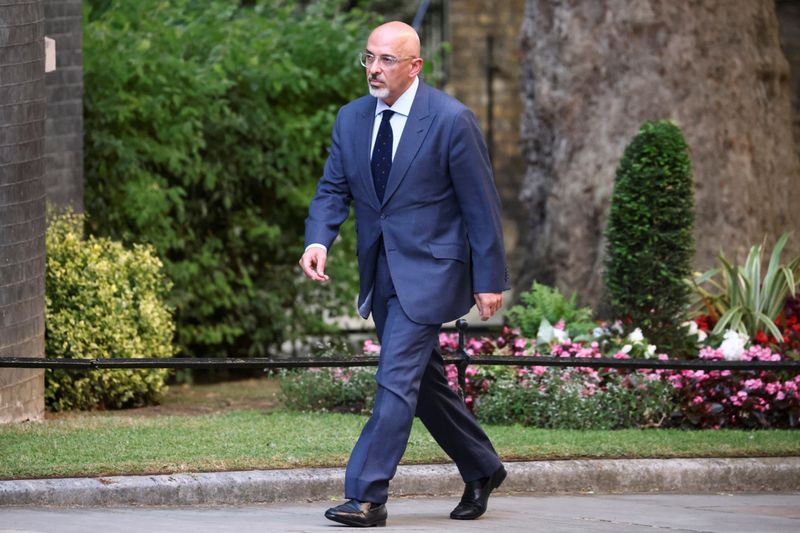
London: Prime Minister Boris Johnson named Nadhim Zahawi his new Chancellor of the Exchequer, moving swiftly to replace Rishi Sunak, as the government comes under mounting pressure to tackle the worst cost-of-living crisis in a generation.
Zahawi, 55, becomes finance minister after previously serving as Johnson’s education secretary. He rose to prominence for his role in overseeing the nation’s successful vaccination roll-out during the Covid-19 pandemic, and is widely regarded within the ruling Conservative Party as a safe pair of hands with a record of delivery.
Johnson is trying to re-assert control over his fractured Conservatives just hours after Sunak and Health Secretary Sajid Javid resigned while the prime minister was on the airwaves expressing remorse for his handling of the latest scandal to buffet the party.
Sunak quit after almost two and a half years running the Treasury telling Johnson in his resignation letter that the government “cannot continue like this.” His and Javid’s resignations in quick succession threatened to push Johnson to the brink in the wake of a string of missteps that have damaged his standing in the party and with the electorate.
Refugee
Zahawi was born in Baghdad to Kurdish parents and came to the UK as a boy, after his family fled Saddam Hussein’s Iraqi regime in the 1970s. Unable to speak English when he arrived, Zahawi has spoken about how he was bullied at school.
He trained as a chemical engineer at University College London, going on to work in the oil industry. A self-made millionaire who co-founded the polling firm YouGov, he entered Parliament in 2010, where he has represented Stratford-on-Avon ever since. He backed Brexit in 2016.

Zahawi has been a staunch defender of Johnson throughout the partygate scandal, regularly appearing on broadcast media in the months since the initial Downing Street party revelations. He and his wife also reportedly own five residences worth 17 million pounds.
Little is known publicly known about Zahawi’s economic views, though he has in the past advocated for tax cuts. He now takes the reins of an increasingly fragile economy.
Stagnation
The OECD already predicts growth will stagnate next year and lag behind every member of the Group of 20 aside from Russia. While unemployment is the lowest since the 1970s, inflation is at its highest in four decades, consumer confidence is the lowest in at least half a century and workers across the travel industry are striking in a push for more pay just as the summer holidays begin.
Zahawi’s first order of business could be a long-awaited joint speech with Johnson setting out how the government plans to deliver on its pledge to fix low productivity and create a high wage-low tax economy six years after Brexit.
Sunak said in his resignation letter that the plan was due to be unveiled next week. But he revealed a split by telling Johnson “it has become clear to me that our approaches are fundamentally too different.”
Johnson and Zahawi also have big calls to make on tax policy. The government is due to increase corporation tax to 25% from 19% next spring, but Johnson and Sunak were reported to disagree over whether to go ahead with the hike.
Tory MPs have long called for more general tax-cutting by Johnson’s government, and a key question is whether Zahawi will be more receptive to the idea than Sunak, who repeatedly said he had to be responsible in managing the public finances.
Tax decisions
Zahawi previously served as a business minister between 2019 and 2020. While he hasn’t made any significant recent comments about tax policy, in 2017 he wrote an article calling for the basic rate of income tax to be cut for younger people.
He also has decisions to make about payroll taxes and whether to announce further support to help with Britain’s cost-of-living crisis. Critics contend the government directly contributed to households’ pain by this year raising payroll taxes to fund the National Health Service and care for the elderly.
In May, Sunak announced an additional 15 billion pounds ($18 billion) of aid for families struggling to make ends meet, taking total support to 37 billion pounds. He left government a day before workers get Pound6 billion of tax relief.
Another important decision is what to do about the government’s super-deduction policy on business investment, where companies can reduce their tax bill by 25 pence for every 1 pound they invest. The policy is due to expire in March and Sunak’s team had been working on a replacement.
Sunak, a former Goldman Sachs Group Inc. banker and supporter of Brexit, became one of the country’s favourite politicians as he doled out over 300 billion pounds protecting workers and businesses during the pandemic.
His star later faded, however, as he presided over a series of tax rises that lifted the UK tax burden to its highest since the late 1940s. He was also fined by police for briefly attending a party during social distancing restrictions and faced embarrassing headlines earlier this year about his rich wife’s taxes.








